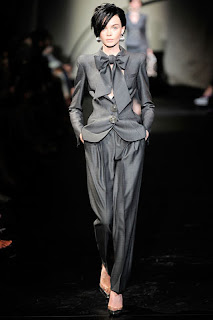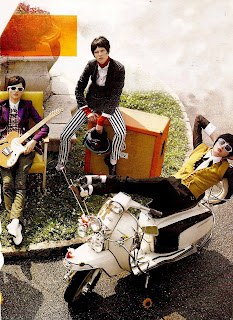--Coco Chanel
Regardless of Chanel's wishes, often street trends make their way into high fashion because fashion designers are always searching for new ideas, and young people on the street are accessible sources of creative, fresh looks. Each street trend is linked to a youth-driven subculture that is more or less a reaction to conformity.
A peek at street trends and their runway equivalents:
ZOOT SUIT
The zoot suit consists of a boxy jacket paired with pants that feature a high waistline and peg-legs. Derived from Harlem jazz culture, the look was popularized as a status symbol among teenage boys in African-American, Latin, and Hispanic communities in the 1930s and 1940s.
 In the 1940s in L.A., riots erupted between white military personnel and Latino youths. The Latinos were recognizable by their zoot suits, so the events were known as The Zoot Suit Riots.
In the 1940s in L.A., riots erupted between white military personnel and Latino youths. The Latinos were recognizable by their zoot suits, so the events were known as The Zoot Suit Riots. Modern costume-style zoot suits are available
Modern costume-style zoot suits are availableat many costume and vintage clothing rental stores today.
High Fashion:
Alexis Mabille, Fall 2009 Couture
Boxy suit
Boxy suit
 Jean Paul Gaultier, Fall 2009 Couture
Jean Paul Gaultier, Fall 2009 CoutureFedoras were often paired with Zoot Suits
BEATNIK
The Beat writers (fronted by Jack Kerouac, Neal Cassady, Allen Ginsberg, and William S. Borroughs) became well-known in the 1950s for their existentialism, rebellion, rejection of mainstream values, and goals to better their innerselves. The writers inspired a cultural movement, of which the participants were called Beatniks. They were recognizable by their striped shirts, dark sunglasses, turtlenecks, slim-legs pants, and berets. Their choice to dress in simple clothes arose from their hatred of materialism and consumerism.
 Lady Beatnik dancer in the 1950s in the traditional black leggings
Lady Beatnik dancer in the 1950s in the traditional black leggingsand clingy black top associated with the beatnik look
 Cover of "The First Third" by Neal Cassady, 1971.
Cover of "The First Third" by Neal Cassady, 1971.Photo of Neal Cassady and Jack Kerouac,
prominent writers during the Beat Generation

 In the 1957 film "Funny Face," Audrey Hepburn portrays philosophical bookworm, Jo Stockton. Her beatnik-style costume became so iconic that the top photo was featured in a Gap ad for skinny black pants in Fall 2006. Ironically, a beatnik look was used to spread the very consumerism that the beatniks opposed.
In the 1957 film "Funny Face," Audrey Hepburn portrays philosophical bookworm, Jo Stockton. Her beatnik-style costume became so iconic that the top photo was featured in a Gap ad for skinny black pants in Fall 2006. Ironically, a beatnik look was used to spread the very consumerism that the beatniks opposed. Betsey Johnson, Fall 2008
Betsey Johnson, Fall 2008The runway was staged to resemble a coffeehouse,
in which beatniks played instruments and recited poetry.
TEDDY BOY
Beginning in London in the 1950s, the Teddy Boy subculture made it acceptable for young men to care about how they looked. They dressed for show, sporting ties, tailored suits, and carefully groomed hairdos.
 Teddy Boys in Grangetown, Wales, circa early 1950s
Teddy Boys in Grangetown, Wales, circa early 1950s Maintaining his traditional Teddy Boy hairdo, circa 1960
Maintaining his traditional Teddy Boy hairdo, circa 1960 In the 1970s, rockabilly music renewed the look.
In the 1970s, rockabilly music renewed the look. John Cryer as Teddy Boy, Duckie, in "Pretty in Pink", 1986
John Cryer as Teddy Boy, Duckie, in "Pretty in Pink", 1986 Modern Teddy Boy look, Burberry, 2006
Modern Teddy Boy look, Burberry, 2006This ad features the typical Teddy Boy hairdo,
slicked back at the sides with a quiff in front
 Armand Basi, Fall 2009
Armand Basi, Fall 2009Pants that taper in at the ankles
and a different take on the Teddy Boy hairstyle
 Ashley Olsen in the Teddy Boy look
Ashley Olsen in the Teddy Boy lookMOD
The Mod subculture became widespread in London in the 1960s and focused on fashion, music, scooter-riding, and dancing. Their look consisted of minimal silhouettes, bright colors, and bold lines.
 Andy Warhol's muse, Edie Sedgwick, in a mod outfit in the 1960s
Andy Warhol's muse, Edie Sedgwick, in a mod outfit in the 1960s With Warhol, Edie Sedgwick wore the iconic mod A-line mini dress in the 1960s.
With Warhol, Edie Sedgwick wore the iconic mod A-line mini dress in the 1960s. Model, Twiggy wore mod fashions in the 1960s,
Model, Twiggy wore mod fashions in the 1960s,and was a fashion icon of the subculture and time period.
 Twiggy sports the hairdo and thick eye makeup indicative of the mod look.
Twiggy sports the hairdo and thick eye makeup indicative of the mod look. Twiggy wore the bold colors and simple silhouettes that characterized mod fashion.
Twiggy wore the bold colors and simple silhouettes that characterized mod fashion.HIPPIE
The hippie subculture began in the 1960s in the US and is marked by counterculture, the sexual revolution, drug use, and psychedelic rock. Acting out against war and establishment, hippies favored ethnic clothes and jeans.

 Hippies in the 1960s
Hippies in the 1960swore colorful loose-fitting clothes, tie-dye, floral prints, headbands, and feathers.
 Diane Von Furstenberg, Spring 2009
Diane Von Furstenberg, Spring 2009The floral headband and loose floral dress indicate hippie influences.
 Miss Sixty, Spring 2009 RTW
Miss Sixty, Spring 2009 RTWSkin exposure was also a hippie tendency, as they were immodest with their bodies and opted for sexual freedom.
_______________________________________________
DISCO
The Disco look is associated with the genre of dance music that appeared in the 1970s. As an antidote to the hippies' fashion, and for ease of dance movement, their fashions featured flashy, stretchy, synthetic fabrics. The looks proliferated at the New York City club, Studio 54.
 Gloria Gaynor was a popular disco singer in the 1970s
Gloria Gaynor was a popular disco singer in the 1970swho wore flashy outfits to match the popular look of the times
 The Bee Gees were foremost disco stars in the 1970s
The Bee Gees were foremost disco stars in the 1970swho wore metallic outfits of synthetic materials
 "Saturday Night Fever" is a 1977 film about a youth who is king at the discotheque.
"Saturday Night Fever" is a 1977 film about a youth who is king at the discotheque.It made disco fashions visible to wide audiences.
 Singing sensations from the 1970s, ABBA,
Singing sensations from the 1970s, ABBA,in disco fashion including bell-bottoms
 Naheen Khan, Spring 2009
Naheen Khan, Spring 2009Metallic fabrics
 Alberta Ferretti, Spring 2009
Alberta Ferretti, Spring 2009This flashy outfit resembles one that would have been worn in the 1970s by a disco star such as Donna Summer
PUNK
Punk became widespread originally in London in the 1980s and is associated with punk rock music. The subculture is marked by anarchy, non-conformity, animal rights, and anti-capitalism, among many other ideals. As many punks favor the Do It Yourself aesthetic, the fashions consist of leather jackets, combat boots, and tight pants that have been hand-decorated with metal studs, patches, stitching, and paint. Tattoos, eye makeup, and heavily dyed and gelled extreme mohawks complement their outfits. Alternately, some punks favor anti-fashion because they argue that the culture should be defined by its music and beliefs instead of material items such as clothes. These punks wear plain jeans and white t-shirts.
 Sid Vicious of the influential punk rock band, The Sex Pistols,
Sid Vicious of the influential punk rock band, The Sex Pistols,with girlfriend Nancy in the 1970s
They sport the adorned leather jackets, dyed and spiked hair, and tattered jeans associated with punk fashion.
High Fashion:
 Vivienne Westwood, Fall 2009
Vivienne Westwood, Fall 2009The tight black pants, extreme hairdo, and heavily decorated top were influenced by punk style.
 Yves Saint Laurent, Fall 2009 RTW
Yves Saint Laurent, Fall 2009 RTWLeather jacket with studded collar, reminiscent of the punk look
HIP HOP
The hip hop cultural movement became popular, especially among African-American youths, in New York City in the 1980s and is marked by hip hop music, graffiti art, DJing, and break dancing. The look features bright colors, heavy chain necklaces, baggy denim, caps, sunglasses, branded clothes, and athletic jackets.
 Posing in front of graffiti which is associated with hip hop culture,
Posing in front of graffiti which is associated with hip hop culture,these men wear typical hip hop fashions.
High Fashion:
Vivienne Westwood plaid trousers
Diesel red sunglasses
Dior sneackers
_______________________________________________Diesel red sunglasses
Dior sneackers
New street trends emerge since fashion is always changing, and fashionable people are always searching for new looks. Street trends are almost always a result of the culture in the given place and time, and since times change, fashion changes along with it. These are two street trends I've noticed:
THE NEWSBOY LOOK
Newsboys, or Newsies, were the primary distributors of newspapers from the mid-1800s to the early 1900s. Since they were usually homeless children, they wore modest, shabby clothes. This look has inspired a street trend which resembles a rumpled, shabby, schoolboy uniform. It looks vintage and European. Featured are "newsies" caps, tweeds, plaids, worn-in leather oxfords with laces, vests, collared shirts, blazers, and pedal pushers. Common colors are brown, gray, navy blue, tan, black, and white.
 The characters in 1992's "Newsies" wear examples of the look.
The characters in 1992's "Newsies" wear examples of the look.The film is based on the Newsboys Strike of 1899 in New York City.
 A couple sporting the look in Japan, circa 2000
A couple sporting the look in Japan, circa 2000Her overalls and his shirt and trousers by Christopher Nemeth
Shoes by Belly Button
 The outfit on Tiny Tim, of "A Christmas Carol", is an example of the look.
The outfit on Tiny Tim, of "A Christmas Carol", is an example of the look.Like the newsboys, Tiny Tim was a pitiful young boy in rumpled clothes.
 In Japan, circa 2000
In Japan, circa 2000Jacket, Shirt, and Trousers by Christopher Nemeth
Shoes by John Moor
Hat by World's End
 The look featured in a fashion photo spread, circa 2006
The look featured in a fashion photo spread, circa 2006Jumpsuit by Mayle
Shirt by Diesel
Belt by 3.1 by Philip Lim
Shoes by Clarks
Newspaper backdrop is a nod to the newsboys whose fashions influenced this photoshoot.
THE ECCENTRIC OLD LADY LOOK
Since mature women usually lack self-consciousness and have more money than youths,
they are able to dress expressively and nicely,
and thus, inspire trends among younger girls.
they are able to dress expressively and nicely,
and thus, inspire trends among younger girls.

 Mary-Kate Olsen is credited with making the eccentric old lady look a street trend.
Mary-Kate Olsen is credited with making the eccentric old lady look a street trend. Old lady style, circa 2007
Old lady style, circa 2007 Old lady style, circa 2009
Old lady style, circa 2009High Fashion:
 Luella, Spring 2009
Luella, Spring 2009Tea dresses, florals, pleats, blouses, broaches, tweeds, and pastels
create an eccentric old lady feeling
 The old lady look by Juicy Couture
The old lady look by Juicy Couture Diane Von Furstenberg, Fall 2009
Diane Von Furstenberg, Fall 2009The floral hat and droopy wool sweater create old lady style
 Mary-Kate Olsen in a fashion photo spread inspired by the old women who lived at Grey Gardens.
Mary-Kate Olsen in a fashion photo spread inspired by the old women who lived at Grey Gardens.From "Bazaar" magazine, October 2007.
Bodysuit and skirt by Miu Miu
Leggings by Blumarine
Hat by Christine A. Moore Millinery
Gloves by Etro
Ring by Hari Jems
Shoes by Prada
 The inspiration for Bazaar's photo spread.
The inspiration for Bazaar's photo spread. Possibly unintentionally, Little and Big Edie Beale of Grey Gardens
Possibly unintentionally, Little and Big Edie Beale of Grey Gardensbecame fashion icons in the 1970s.
_____________________________________________________














































No comments:
Post a Comment